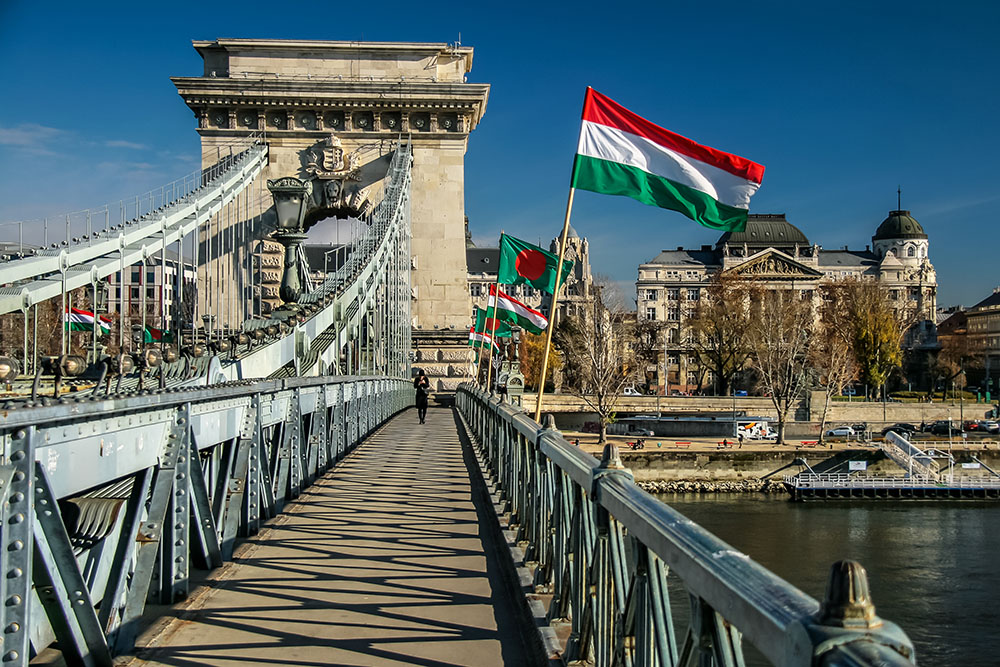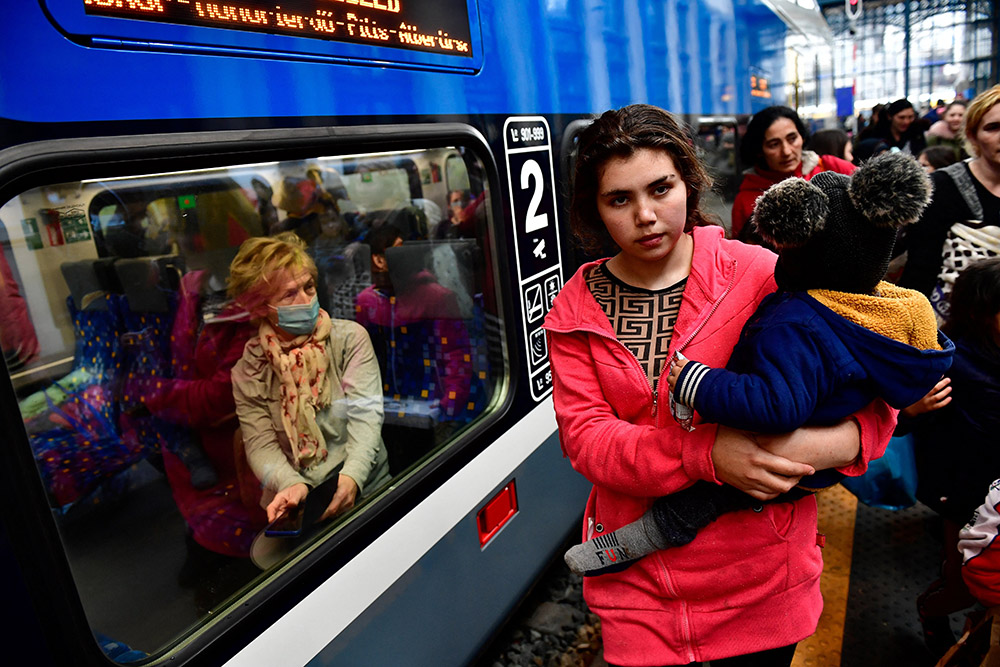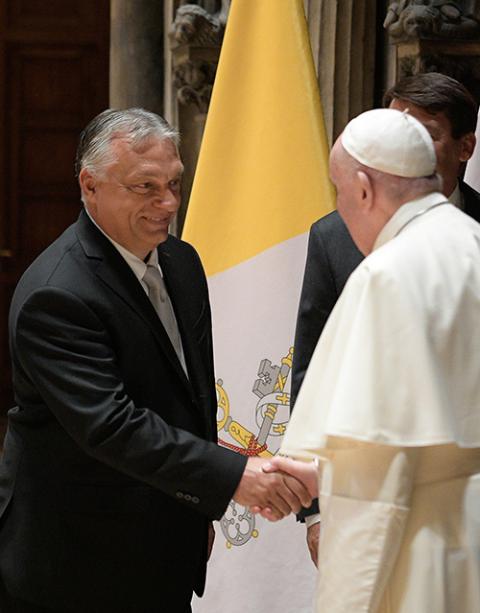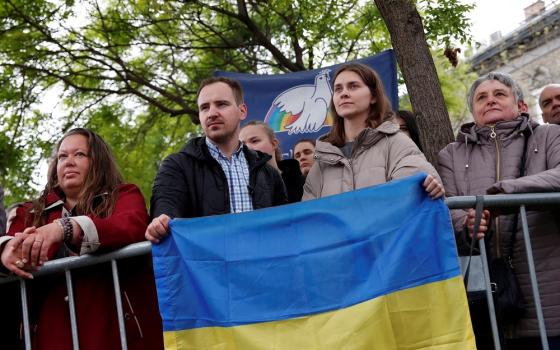
A pedestrian crosses Széchenyi Chain Bridge in Budapest, Hungary, in a 2016 file photo. (Wikimedia Commons/Jorge Franganillo)
Hungarian Prime Minister Viktor Orbán wants to have it all, positioning himself as both an ally of Donald Trump and of Pope Francis.
When Trump was indicted on criminal charges earlier this month for alleged hush payments to a porn star during his 2016 campaign, Orbán took to social media with a message of support for the former U.S. president, whose isolationist sympathies aligned the two men.
"Keep on fighting," he wrote on Twitter. "We are with you."
Yet Orbán, who has cast himself as a defender of Christianity and traditional values and pursued staunch nationalist and anti-immigrant policies, has also made great efforts to project a united front with the more globally minded Francis and the Holy See, claiming that Hungary and the Vatican are the only two powers truly working for peace in Ukraine.
When the pope arrives in Budapest on April 28 for a three-day visit to the Hungarian capital, where he will meet with Orbán, banners will greet Francis with the trip's official logo that includes an image of the city's iconic chain bridge. The bridge spans the Danube River and connects the city's eastern and western neighborhoods — but the image also serves as a nod to a metaphor the pope has often used to emphasize the importance of building bridges between nations and peoples.
While brief, this 41st foreign trip since becoming pope in 2013 may prove to be a difficult journey that tests those limits.
The pope's peace message on Ukraine
During his Sunday Regina Caeli address on April 23, Francis stood in the window of the Vatican's Apostolic Palace and said he look forward to traveling this week to the center of Europe, "over which the icy winds of war continue to blow, while the displacement of so many people puts urgent humanitarian questions on the agenda."
For years, Orbán has pursued strict anti-immigration policies, harshly saying his country has been invaded by African and Middle Eastern migrants and warning that migration threatened the country's identity.
Russia's February 2022 invasion of Ukraine, which shares an 85-mile border with Hungary, has led to at least a temporary softening of both his rhetoric and policies, with the United Nations estimating more than 2 million refugees passing through Hungary since the start of the war.

Refugees fleeing Russia's invasion of Ukraine walk through the Nyugati railway station in Budapest, Hungary, Feb. 28, 2022. (CNS/Reuters/Marton Monus)
Upon arriving in Budapest, Francis will walk a tightrope, affirming the efforts to welcome new arrivals and attempting to continue to plead for an end to the war, while not alienating Ukrainian leaders and other Western allies who fear the pope's peace message could be instrumentalized by Russia and its allies, including Orbán.
According to Budapest-based journalist Alex Faludy, Francis' calls for peace and an end to the war are motivated by Catholic social teaching, while "Orbán's calls for an immediate cease-fire, which would in practice work to Russia's advantage, arise from geopolitical alignment with Moscow."
"Orbán' will want to elide the two for domestic and international purposes," Faludy told NCR.
During his first day in the country, the pope will hold private meetings with Orbán and Hungary's President Katalin Novák, followed by a public address to the country's government leaders, politicians and other members of civil society. He will then meet with a number of refugees, including those from Ukraine, during his second day in the capital.
Hungarian theologian Rita Perintfalvi said that while the pope's words and actions will be watched carefully, she believes his decision to visit Hungary was a "very conscious" one, meant to stir the hearts of Hungarians to recognize what is at stake in this war.
"The Hungarian people, and among them many Catholic Christians ... have even turned against the victims and are demanding that they surrender so that peace could be achieved," she told NCR. "But this is not peace, this is the annihilation of a sovereign state."
Advertisement
By contrast, she noted that the pope has likened the war to a genocide.
"There is perhaps no other country in Europe that is so much in need of redemption from this immoral depravity and lack of solidarity with those who suffer as Hungary," said Perintfalvi. "I think this is why Pope Francis is coming: because this country is a mission territory, where he must, as the prophet Ezekiel put it, remove the heart of stone from the bodies of the people and give them the heart of flesh so that they may have life again."
A spiritual detox
In September 2021, Francis visited Budapest for less than seven hours to close out the International Eucharistic Congress, vowing to return for a more substantial visit.
Faludy says he believes Hungary's relationship with the Holy See has "considerably improved" since that time. He noted that attacks on Francis from members of Orbán's Fidesz party and its controlled media — where allies of the prime minister have referred to the pope as a "demented old man" due to his championing of migrants and more globalist policies — have dwindled.
In Faludy's view, bridges have been built between the Vatican and Hungary over a range of issues, including concern for persecuted Christians in the Middle East, pro-family policies and the war in Ukraine.
"Whether the alignment in substance is as strong as the messaging suggests is debatable, but at a communications level the apparent overlap can be made to look good," said Faludy.

Pope Francis greets Hungarian Prime Minister Viktor Orbán in Budapest, Hungary, on Sept. 12, 2021. (CNS/Vatican Media)
At a recent press briefing,Vatican's press office director, Matteo Bruni, told reporters that the pope's 2021 visit was to support members of more than 80 countries who were on hand for the Eucharistic Congress, whereas this visit is meant to galvanize the local Hungarian Christian community.
Along with a public Sunday Mass, the pope is scheduled to visit Pázmány Péter Catholic University, hold a visit with young people and meet with members of Hungary's Greek Catholic community.
Hungarian theologian Péter Szabó said that he believes the trip will allow the pope an opportunity to develop a more nuanced view of Hungary that Szabó says is not always understood from the outside.
"My homeland has been a laboratory for the last 100 years: how to survive the complete dismemberment of a country (1920), how to survive nearly half a century of foreign oppression, and finally how to survive a post-modern environment that is increasingly intolerant of views other than the only accepted 'official' vision, including by this reason intolerance towards certain teachings of the gospel as well," he told NCR via email.
Catholicism is the largest religion in the country of 10 million, with the majority being Latin rite Catholics. Szabó, who is a member of the Greek Catholic Church, said it was a great surprise and blessing that the pope added a visit to a church of the roughly 250,000 Byzantine Catholics in Hungary.
Hungary's Christian roots, which go back over 1,000 years, have been tested through communism and the Cold War — and according to some, are now being obscured by politicians for their own purposes.
Perintfalvi said she hopes the pope's visit might provide a "spiritual detoxification" so that Hungary can "truly rediscover the genuine message of Christianity."
While she believes Orbán may try to use this visit to promote his own agenda, she says she is praying it's the pope's message that carries the day.
"Pope Francis is one of the greatest prophets of our times, who not only teaches but also heals, not only with his words, but also with his deeds," said Perintfalvi. "We pray that he may be able to reach the heart of our church and its leaders."






